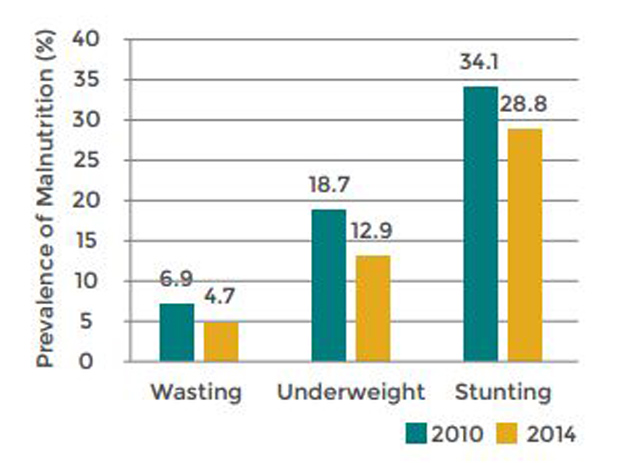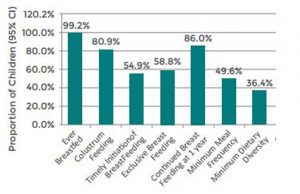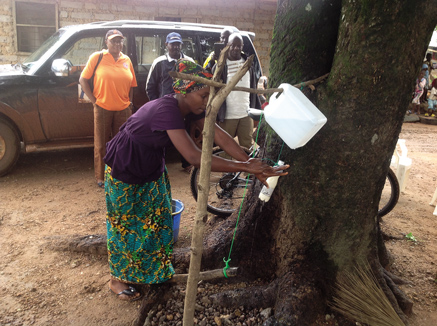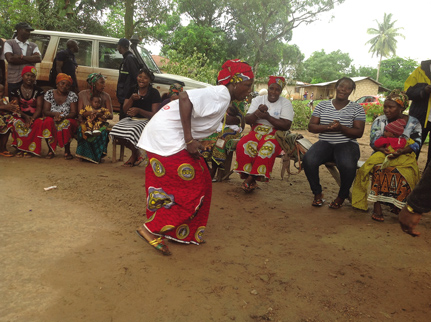Focusing on the community: Mothers in action for improved nutrition
[vc_row row_type=”row” text_align=”left” css_animation=””][vc_column width=”1/2″][/vc_column][vc_column width=”1/2″][vc_column_text custom_options=””] Ms. Aminata Shamit Koroma Director of Food & Nutrition, National SUN Technical Focal Point, Ministry of Health & Sanitation – Sierra Leone[/vc_column_text][/vc_column][/vc_row][vc_row row_type=”row” text_align=”left” css_animation=””][vc_column][vc_separator type=”transparent”][/vc_column][/vc_row][vc_row row_type=”row” text_align=”left” css_animation=””][vc_column][vc_column_text custom_options=””] Laying strong foundations – Coordinating actors and establishing…
[vc_row row_type=”row” text_align=”left” css_animation=””][vc_column width=”1/2″]

[vc_column_text custom_options=””]“Our grandmothers and mothers are an important driving force in community development. We must therefore empower them for the improvement of the nutritional status of our communities.”
Ms. Aminata Shamit Koroma
Director of Food & Nutrition, National SUN Technical Focal Point, Ministry of Health & Sanitation – Sierra Leone[/vc_column_text][/vc_column][/vc_row][vc_row row_type=”row” text_align=”left” css_animation=””][vc_column][vc_separator type=”transparent”][/vc_column][/vc_row][vc_row row_type=”row” text_align=”left” css_animation=””][vc_column][vc_column_text custom_options=””]
Laying strong foundations – Coordinating actors and establishing sound policy
Sierra Leone’s multi-sectoral Food and Nutrition Security Implementation Plan 2013-2017 (FNSIP) brings together line ministries (health, agriculture, gender, finance, local government etc.), non-governmental organisations (NGOs) and civil society organisations (CSOs) in a coordinated manner to address the burden of undernutrition among women and children and support scaling up nutrition. In addition, women’s empowerment has been mainstreamed into existing policies and plans, including:
- The Smallholder Commercialization Programme
- The Sustainable Nutrition and Agriculture Programme
- The National Gender Strategic Plan
- The National Policy on the Advancement of Women (adopted by Government in 2000)
Unfortunately, the Ebola outbreak has hampered the gains made over the years on women’s empowerment. As Sierra Leone recovers from the outbreak, the country is focusing on strengthening existing structures that are geared towards the empowerment of women.[/vc_column_text][/vc_column][/vc_row][vc_row row_type=”row” text_align=”left” css_animation=””][vc_column][vc_separator type=”transparent”][/vc_column][/vc_row][vc_row row_type=”row” text_align=”left” css_animation=””][vc_column][vc_column_text custom_options=””]
The Mother Support-Groups Model
As featured in Sierra Leone’s Food and Nutrition Security Implementation Plan for 2013-2017, Mother SupportGroups (MSG) provide an example of a community structure that creates a safe environment of respect,attention, gratitude, sincerity, and empathy. These groups consist of 5-15 members who are facilitated by a ‘Lead Mother’ with good communication and listening skills. MSG members are trained as community infant
and young child feeding counsellors, provided with community infant and young child feeding counselling
cards and Mid Upper Arm Circumference (MUAC) tape to carry out group facilitation as well as individual counselling and self-screening of children aged 6-59 months within their community. Thanks to efforts like these, there has been a gradual improvement in children’s nutritional status and infant feeding practices as indicated in the graphs below:
[/vc_column_text][/vc_column][/vc_row][vc_row row_type=”row” text_align=”left” css_animation=””][vc_column][vc_separator type=”transparent”][/vc_column][/vc_row][vc_row row_type=”row” text_align=”left” css_animation=””][vc_column width=”1/2″][vc_column_text custom_options=””]  [/vc_column_text][/vc_column][vc_column width=”1/2″][vc_column_text custom_options=””]
[/vc_column_text][/vc_column][vc_column width=”1/2″][vc_column_text custom_options=””] [/vc_column_text][/vc_column][/vc_row][vc_row row_type=”row” text_align=”left” css_animation=””][vc_column][vc_column_text custom_options=””]Source: Sierra Leone National Nutrition Survey (SLNNS) 2010 & 2014 using SMART methodology[/vc_column_text][/vc_column][/vc_row][vc_row row_type=”row” text_align=”left” css_animation=””][vc_column][vc_separator type=”transparent”][/vc_column][/vc_row][vc_row row_type=”row” text_align=”left” css_animation=””][vc_column][vc_column_text custom_options=””]
[/vc_column_text][/vc_column][/vc_row][vc_row row_type=”row” text_align=”left” css_animation=””][vc_column][vc_column_text custom_options=””]Source: Sierra Leone National Nutrition Survey (SLNNS) 2010 & 2014 using SMART methodology[/vc_column_text][/vc_column][/vc_row][vc_row row_type=”row” text_align=”left” css_animation=””][vc_column][vc_separator type=”transparent”][/vc_column][/vc_row][vc_row row_type=”row” text_align=”left” css_animation=””][vc_column][vc_column_text custom_options=””]
Integrated service delivery with women at the centre
The Ministries of Health and Sanitation, Agriculture, Education and Social Welfare all work together with
nutrition implementing partners (United Nations partners, NGOs and community based organisations) to ensure that the services offered by MSGs are as harmonized as possible. Examples of how this is done include:

- Health and Nutrition – Counselling by MSGs, self-screening and referrals, food diversification/cooking demonstration, distribution of mosquito nets, family planning, food rationing for malnourished pregnant
women and lactating mothers with water, sanitation and hygiene - Agriculture and Livelihood – Linking MSGs with Agriculture Business Centres to build skills around community gardening, crops diversification, preservation and processing as well as crop storage
- Social Welfare – Initiating Village Savings and Loan programmes for MSGs as a means of improving income generation for women at the community level
- Education – Capacity building through training (vocational and adult literacy classes)
Challenges
Thanks to Sierra Leone’s integrated approach to service delivery, women are now better placed to advocate
and demand that their voices are heard and that their gender-based interests are considered on the national
development agenda. However, despite efforts by women to participate on an equal footing with men in democratic processes, cultural impediments, illiteracy and other political structures that tend to lower the status of women still stand in the way.

While progress is tangible, Sierra Leone still needs to increase the number of women represented in parliament and appointments to ministerial positions in government. At the local level, women are still often viewed as unsuitable for local authority positions, such as paramount chiefs and tribal heads.
Beyond the inadequate space for women in politics, traditional and cultural beliefs are also strong contributing factors towards discrimination against women in society. For example, acquisition of properties, especially land, after the death of the husband is impossible as it is traditionally believed that ownership can only pass to the decedent’s male kin. Too often, food distribution within the household unfairly favours men. Disempowering traditional practices have also affected Sierra Leone’s educational system with far too few women attaining higher levels of education.
[/vc_column_text][/vc_column][/vc_row][vc_row row_type=”row” text_align=”left” css_animation=””][vc_column][vc_separator type=”transparent”][/vc_column][/vc_row][vc_row row_type=”row” text_align=”left” css_animation=””][vc_column][vc_column_text custom_options=””]
Opportunities to overcome challenges
Although faced with the above challenges, the Government of Sierra Leone can clearly see the opportunities to move forward. They are planning to engage the media to conduct robust advocacy and awareness raising on gender equality and equity. They are also considering ways to provide free post-primary education, school meals, take-home rations and higher education scholarships for girls.
By investing in education, Sierra Leone will be much better positioned to increase women’s participation
in decision-making positions and processes at all levels of government as well as within traditional and household authority structures.[/vc_column_text][/vc_column][/vc_row][vc_row row_type=”row” text_align=”left” css_animation=””][vc_column][vc_separator type=”transparent”][/vc_column][/vc_row][vc_row row_type=”row” text_align=”left” css_animation=””][vc_column]
Lessons learned
- It’s important to get the right policies and structures in place to empower women and scale up nutrition. A multi-sectoral approach, which incorporates women’s empowerment issues into existing policies and strategic plans, is one effective way to do this.
- Community level action is paramount. Mother support groups form a core pillar of Sierra Leone’s efforts to
improve nutrition. Allowing women the space to discuss their problems, identify solutions and take action has led to significant gains. - Mother support groups need support from all relevant sectors – health, agriculture and livelihoods, social
welfare and education to really maximise opportunities for women to lead on efforts to improve nutrition. - Development partners can amplify efforts of mother support groups by building on their success and
established relationships. - Continuous focus on girls education and increasing women’s participation in decision-making processes is
essential.